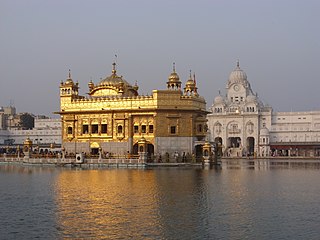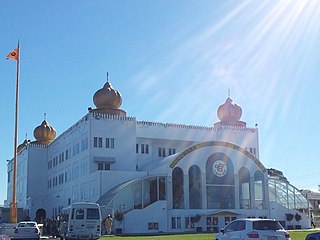Sikhism, or SikhiSikkhī, pronounced [ˈsɪkːʰiː], from Sikh, meaning a "disciple", "seeker," or "learner") is a religion that originated in the Punjab region in the northern part of the Indian subcontinent around the end of the 15th century, and has variously been defined as monotheistic, monistic and panentheistic. It derived from the prevalent Bhakti traditions in North India. It is one of the youngest of the major world religions, and the world's fifth largest organized religion, as well as being the world's ninth-largest overall religion. The fundamental beliefs of Sikhism, articulated in the sacred scripture Guru Granth Sahib, include faith and meditation on the name of the one creator, divine unity and equality of all humankind, engaging in selfless service, striving for justice for the benefit and prosperity of all, and honest conduct and livelihood while living a householder's life. In the early 21st century there were nearly 25 million Sikhs worldwide, the great majority of them living in Punjab, according to the Encyclopaedia Britannica.
Sikhs are people associated with Sikhism, a monotheistic religion that originated in the 15th century, in the Punjab region in the northern part of the Indian subcontinent, based on the revelation of Guru Nanak. The term "Sikh" has its origin in the Sanskrit words शिष्य, meaning a disciple, or a student. A Sikh, according to Article I of the Sikh Rehat Maryada, is "any human being who faithfully believes in One Immortal Being; ten Gurus, from Guru Nanak to Guru Gobind Singh; Guru Granth Sahib; the teachings of the ten Gurus and the baptism bequeathed by the tenth Guru".
Uday (also transliterated as Odai, Oday, Ouday, or Udai, is an Arabic masculine name, the meaning of Udai in Arabic is "Runner, The one who runs fast

The Sikh Regiment is an infantry regiment of the Indian Army that recruits from the Sikh community. It is the most decorated regiment of the Indian Army and in 1979, the 1st battalion was the Commonwealth's most decorated battalion with 245 pre-independence and 82 post-independence gallantry awards, when it was transformed into the 4th battalion, Mechanised Infantry Regiment. The first battalion of the regiment was officially raised just before the annexation of the Sikh Empire on August 1 1846, by the British East India Company. Currently, the Sikh Regimental Centre is located in Ramgarh Cantonment, Jharkhand. The Centre was earlier located in Meerut, Uttar Pradesh.
Naming conventions in Fiji differ greatly, both between and within ethnic groups in Fiji. Indigenous Fijians have a set of cultural practices which today are more loosely followed, and to some extent blended with elements of European culture with regard to names. In the Indian community, traditional Indian naming practices co-exist with influence from the Fijian and European cultures.

The Nanakshahi calendar is a tropical solar calendar which is used in Sikhism and is based on the 'Barah Maha'. Barah Maha was composed by the Sikh Gurus and translates as the "Twelve Months". It is a poem reflecting the changes in nature which are conveyed in the twelve-month cycle of the Year. The year begins with the month of Chet, with 1 Chet corresponding to 14 March. The first year of the Nanakshahi Calendar starts in 1469 CE: the year of the birth of Guru Nanak Dev.

Sri Muktsar Sahib district is one of the twenty two districts in the Indian Punjab and earlier known as khidraane di dhaab. Its capital, the city of Sri Muktsar Sahib, is renamed from Muktsar to Sri Muktsar Sahib and so the district. Other towns include Malout and Giddarbaha.

Moga district is one of the twenty two districts in the state of Punjab, India. It became the 17th district of Punjab State on 24 November 1995 cut from Faridkot district. Moga District is among the largest producers of wheat and rice in Punjab, India. People from Moga City and Moga District belong to the Malwa culture.

The Battle of Saragarhi was fought before the Tirah Campaign on 12 September 1897 between the British Indian Empire and the Afghan tribesmen. It occurred in the North-West Frontier Province. Sikh soldiers fought on behalf of the British Indian Army against Pashtun Orakzai tribesmen.

Mohali district, also known as Ajitgarh district and officially known as Sahibzada Ajit Singh Nagar district or SAS Nagar district, is one of the twenty two districts of Punjab a state in north-west India. It was formed in April 2006 and is 18th district of Punjab, created next to Pathankot district. This district was carved out of areas falling in Ropar and Patiala District. It is situated next to the union territory of Chandigarh and Panchkula district of Haryana.

Sikhism is the fourth largest religion in India and has existed for 548 years, beginning with the birth of its founder Guru Nanak. The Sikhs are predominantly located in Punjab, but also in many other parts of India. It is also the fifth largest religion in the world, with more than 27 million followers in the world as of the year 2010.
Dr Ajit Swaran Singh became the first Fiji-born Indian to be appointed to the District Court Bench in New Zealand when he was sworn in as a judge in Manukau on 4 November 2002. He joined Wellington-based Ombudsman Judge Anand Satyanand whose parents are of Fiji Indian descent, and Judge Avinash Deobhakta, of the Auckland District Court, who is an Indian from Uganda, as judges of New Zealand who are of Indian origin.
The number of Fiji Indians that could be elected to the Legislative Council was fixed over the years as follows:
Unlike the majority of Fiji's Indian population, who are descendants of Indian indentured labourers brought to Fiji between 1879 and 1916, most of the Sikhs came to Fiji as free immigrants. Most Sikhs established themselves as farmers. Sikhs also came to Fiji as policemen, teachers and preachers. In recent years large numbers of Sikhs have emigrated from Fiji, especially to the United States, Canada, the United Kingdom, Australia and New Zealand. Sikhs in Fiji are generally referred to as Punjabis.

Sikhism is a minority religion followed by 0.5 % of the population of Australia. It is the fastest growing religion in Australia since 2011. The Sikhs form one of the largest subgroups of Indian Australians with 125,000 adherents according to the 2016 census, having grown from 12,000 in 1996, 17,000 in 2001 and 26,500 in 2006. Most adherents can trace their ancestry back to the Punjab region of South Asia, which is currently divided between India and Pakistan.

–
Sewa Singh Sekhwan(Punjabi:ਸੇਵਾ ਸਿੰਘ ਸੇਖਵਾਂ) is the Shiromani Akali Dal (Taksali) was Education minister of Punjab He was sworn in as a cabinet minister for the second time on 26 October 2009. Sekhwan's father Ujagar Singh Sekhwan was MLA from Kahnuwan in 1977 and 1980. He was founder of a group supporting Indian minorities and Dalits front. He remained the president of Akali Dal during the Emergency in India.

General elections were held in British India in 1920 to elect members to the Imperial Legislative Council and the Provincial Councils. They were the first elections in the country's modern history.
Jagmohan Singh Kang is an Indian politician and a member of Indian National Congress. He is a member of Punjab Vidhan Sabha from Kharar. From 2002 to 2007 he was the Minister for Animal Husbandry, Dairy Development Tourism & Fisheries in Punjab Government.










